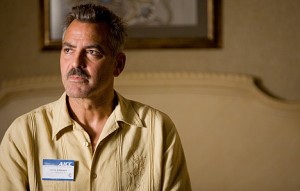There is no denying Mr. Clooney’s outrageous charm. And it is not wasted here, in a movie that is, perhaps, played too much for cheap laughs and not enough for the beauty of its premise – soldiers who defeat enemies with love.
I am tempted to say that this was an opportunity lost, but the movie is better than that. Clooney and McGregor share genuine chemistry and Jeff Bridges adds shades of mysticism to the shamanistic Lebowski he brought to life years ago. But, this is not a Coen brothers movie, and, while it flirts with genius, its success is more apparent in silliness and not in higher ideas.
Clooney is one of a group of supersoldiers trained in the 80’s to use psychic powers to defeat an enemy without hurting him. The group is the brain-child of Jeff Bridges’ Bill Django, who, after a near death experience in Viet Nam, realizes that his soldiers don’t really want to kill the enemy. He goes on a drug-addled new age vision quest to form a plan about how to train soldiers to use psychic powers. Clooney is his prize pupil who has genuine psychic ability.
But all of this is related to McGergor’s reporter by unreliable Clooney as the two give us a buddy-movie, road-movie scenario in 2003 Iraq, with Clooney on top-secret mission and McGregor tagging along for his first big story. We are supposed to ask whether the stories told to McGregor are true, but we are too distracted by the cheap laughs as Clooney attempts to demonstrate a psychic ability that may or may not be there.
The story in Iraq progresses haltingly and without confidence, despite some brilliant satire featuring military subcontractors shooting at each other in a crowded city street and then blaming it all on the locals. Robert Patrick has a tremendous cameo in this sequence as the profiteering suit whose soldiers of fortune are going to clear the way for Starbucks in Iraq as far as the eye can see.
The story of the rise and fall of the Bridges’ supersoldier division is far more interesting, but presented without the appropriate amount of visual trickery that would really make the viewer think that none of this stuff really happened. Kevin Spacey, who I have come to distrust as an actor, turns in a nice performance as the jealous runner-up to Clooney’s psychic ace. His character’s bad temperament morphs into something altogether evil when we see him in the films final act, and this sequence cleverly echoes the black humor of Robert Patrick’s Haliburton-esque cameo.
And to the final sequence – it is redeeming for a film that could have been more and left me with a pleasant feeling. I walked out feeling that something had been accomplished with these characters and I was glad of it. I mostly owe that feeling to the films invocation of M*A*S*H as the perfect referent with which to ruminate upon the absurdity of war. Clooney’s bathrobe-wearing, goat-herding final scenes will remind anyone of Alan Alda’s iconic turn as Benjamin Franklin ‘Hawkeye’ Pierce. Believe me, that is a good thing.
The casting works. The sets and locations are beautiful. In addition to Robert Partick, there are two other small roles that made me smile broadly – Stephen Root as a psychic crack-pot who tips McGregor off to the super-soldiers’ existence, and the under-utilized Stephen Lang as a by-the-book general who genuinely believes in Bridges’ mission.
Is there magic in the world? Can we stop wars with love? Is it all just drug-induced craziness that is overrun by violence and greed? I did not need this movie to answer these questions, but when they were, to my surprise, asked, I found myself wanting a bit more.

